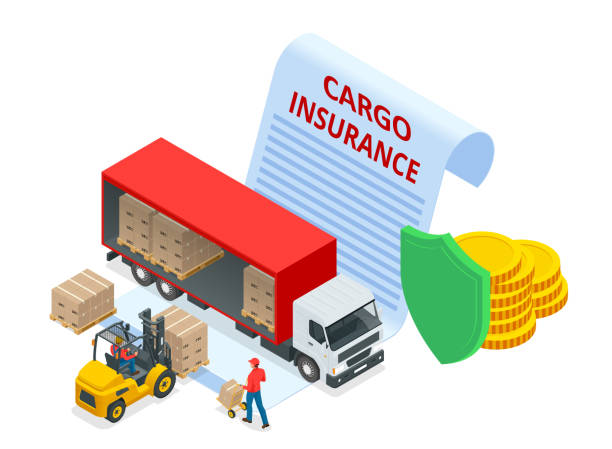Cargo insurance is a must for any business that ships goods, as it provides protection against losses due to unforeseen events such as theft, accidents, or natural disasters. Without it, companies could be left facing crippling financial losses. It is therefore important to consider cargo insurance if your business transports goods, as it can help to ensure that your company’s assets are protected. In this blog post, we will discuss why cargo insurance is important and how it can help to protect your business from financial losses.
What is Cargo Insurance?
Cargo insurance is a vital form of protection for businesses that transport goods. In simple terms, cargo insurance is a policy that covers the loss or damage of cargo during transportation. It provides financial compensation to businesses in case their goods are stolen, damaged, or lost while in transit.
The purpose of cargo insurance is to safeguard businesses from potential financial losses that can occur due to unforeseen events. For example, if a shipment of goods is stolen during transit, the cost of replacing the stolen items can be extremely burdensome for a business. Without cargo insurance, the responsibility and financial burden would fall entirely on the business, potentially causing significant financial strain.
Cargo insurance not only covers theft but also provides protection against accidents and natural disasters. Imagine a scenario where a shipment of fragile goods is involved in a collision, resulting in damage to the entire cargo. The cost of repairing or replacing the damaged goods could be astronomical. However, with cargo insurance, businesses can rest assured knowing that they have financial protection in such situations.
Another important aspect of cargo insurance is that it covers goods from the moment they are loaded onto a carrier until they reach their final destination. This means that businesses are protected throughout the entire transportation process, including any transfers between different modes of transportation, such as trucks, ships, or planes.
In summary, cargo insurance is a crucial safeguard for businesses that transport goods. It provides financial protection against theft, accidents, and natural disasters that can result in significant financial losses. Without cargo insurance, businesses would be vulnerable to these risks and potentially face crippling financial burdens. Therefore, if your business transports goods, it is essential to consider cargo insurance to ensure the protection of your assets.

The Importance of Cargo Insurance for Businesses
Cargo insurance is of utmost importance for businesses that transport goods. Without it, businesses are exposed to significant financial risks that can arise from theft, accidents, or natural disasters. In an increasingly globalized world where trade and transportation are fundamental to business operations, cargo insurance serves as a crucial safeguard to protect businesses from potential losses.
One of the key reasons why cargo insurance is important for businesses is that it provides financial protection in case of unforeseen events. As mentioned earlier, theft during transit can result in substantial financial burdens for businesses. Cargo insurance ensures that businesses are not solely responsible for bearing the costs of replacing stolen goods, thereby preventing potential financial strain. Moreover, accidents and natural disasters can also cause extensive damage to cargo. With cargo insurance, businesses can rest easy knowing that they have the necessary financial protection to cover the cost of repairs or replacements.
Furthermore, cargo insurance provides comprehensive coverage throughout the entire transportation process. This means that businesses are protected from the moment goods are loaded onto a carrier until they reach their final destination. This includes any transfers between different modes of transportation. With cargo insurance, businesses can have peace of mind, knowing that their goods are protected at every stage of the journey.
Another crucial aspect of cargo insurance is its ability to safeguard a company’s assets. The financial losses that can occur due to unforeseen events can be crippling for businesses, especially smaller ones. Cargo insurance serves as a crucial risk management tool that helps businesses protect their assets and maintain financial stability.

Types of Cargo Insurance Coverage
Cargo insurance coverage can vary depending on the needs of your business and the type of goods you transport. Understanding the different types of cargo insurance coverage available can help you choose the right policy for your business. Here are some common types of cargo insurance coverage options:
- All-risk coverage: This type of coverage provides the broadest protection for your cargo. It covers a wide range of risks, including theft, damage, and loss during transit. All-risk coverage is often the most comprehensive option, but it may come with a higher premium.
- Named-perils coverage: Unlike all-risk coverage, named-perils coverage only protects against specific risks that are listed in the policy. This means that only the perils explicitly mentioned in the policy will be covered. While named-perils coverage may have a lower premium, it may leave your business vulnerable to other risks that are not explicitly covered.
- Warehouse-to-warehouse coverage: This type of coverage provides protection for your cargo from the moment it leaves the warehouse of origin until it reaches the final destination warehouse. It covers all stages of the transportation process, including any transfers between different modes of transportation.
- Port-to-port coverage: Port-to-port coverage protects your cargo while it is in transit between different ports. This type of coverage is particularly useful for businesses involved in international shipping, where goods may pass through multiple ports before reaching their final destination.
- Trip transit coverage: Trip transit coverage is designed for businesses that transport goods on a specific trip or journey. It provides protection for the cargo during that particular trip, but may not cover subsequent trips unless specified in the policy.
- Warehouse storage coverage: If your goods need to be stored in a warehouse before or after transportation, warehouse storage coverage can provide protection for any loss or damage that may occur during the storage period. This coverage is particularly important if your goods will be stored for an extended period of time.
When choosing cargo insurance coverage, it’s important to consider the specific needs and risks of your business. Consulting with an experienced insurance provider can help you determine the right coverage options for your business and ensure that your cargo is adequately protected. Remember, investing in the right cargo insurance coverage is an essential step in safeguarding your business from potential financial losses.

How to select the Right Cargo Insurance Provider
Choosing the right cargo insurance provider is a crucial step in ensuring that your business is adequately protected against potential losses. With numerous insurance providers offering different coverage options, it can be overwhelming to find the right one for your business. However, with the following tips, you can make an informed decision and choose the right cargo insurance provider:
- Assess Your Business Needs: Start by assessing the specific needs and risks of your business. Consider the type of goods you transport, the routes you take, and any unique requirements. This will help you determine the coverage options you need and find an insurance provider that offers them.
- Research and Compare Providers: Take the time to research and compare different cargo insurance providers. Look for providers with a solid reputation and a history of providing reliable coverage. Read customer reviews and testimonials to get an idea of their level of service and satisfaction. Compare their coverage options, premiums, and deductibles to find the best fit for your business.
- Check Their Financial Stability: It’s important to choose an insurance provider that is financially stable and able to pay out claims when necessary. Check their financial ratings and inquire about their claim settlement process. A financially stable provider will give you peace of mind knowing that your claims will be handled efficiently and effectively.
- Evaluate their Claims Process: The claims process is a crucial aspect to consider when choosing a cargo insurance provider. Inquire about their response time, documentation requirements, and any additional support they offer during the claims process.
- Seek Professional Advice: Consider seeking advice from an insurance broker or consultant who specializes in cargo insurance. They can provide expert guidance and help you navigate through the complexities of choosing the right provider. Their expertise can be invaluable in making the right decision for your business.
By following these tips, you can choose the right cargo insurance provider that meets your business needs and provides the necessary coverage for your goods. Remember, investing time and effort in choosing the right provider is a critical step in protecting your business from potential financial losses.

Tips for Filing a Claim with Your Cargo Insurance Provider
Filing a claim with your cargo insurance provider is a crucial step in recovering any losses your business may have incurred during the transportation of goods. To ensure a smooth and successful claims process, consider the following tips:
- Promptly Report the Loss: As soon as you become aware of any loss or damage to your cargo, it is important to report it to your insurance provider immediately. Prompt reporting helps ensure that your claim is handled in a timely manner and prevents any potential complications that may arise from delayed reporting.
- Document the Loss: Before filing a claim, gather all relevant documentation that supports your case. This may include shipping documents, bills of lading, packing lists, and photographs of the damaged goods. Providing comprehensive documentation strengthens your claim and increases the likelihood of a successful settlement.
- Adhere to the Policy Requirements: Familiarize yourself with the terms and conditions of your cargo insurance policy. Make sure you understand the specific requirements for filing a claim, such as time limits for reporting and the documentation needed. By adhering to these requirements, you can avoid any potential claim denials or delays.
- Provide Accurate Information: When submitting a claim, ensure that all the information provided is accurate and complete. This includes details about the shipment, the nature of the loss, and any supporting evidence. Inaccurate or incomplete information can lead to claim delays or denials, so take the time to verify the accuracy of all the information you provide.
- Communicate Clearly: Maintain clear and consistent communication with your insurance provider throughout the claims process. Respond promptly to any requests for additional information or documentation and keep a record of all communication. Clear and timely communication helps facilitate a smoother claims process and ensures that any issues or concerns are addressed promptly.
- Seek Professional Assistance: If you encounter any difficulties during the claims process or feel overwhelmed by the documentation requirements, consider seeking assistance from a professional, such as an insurance broker or consultant. Their expertise can help navigate any complexities and increase the likelihood of a successful claim settlement.

By following these tips, you can maximize your chances of a successful claim settlement with your cargo insurance provider. Remember, a well-documented claim, accurate information, and clear communication are key to ensuring a smooth and efficient claims process.





METYUTYJ60628MAERWETT
Craving Your Time and Affection
My heart beats with an unending love for you.
In case you have a bit of free time, would you kindly check out my page through this link: https://tinyurl.com/2x9xg7hv I’ve shared a few fresh photos and revealed updates from current events there. It would be wonderful to catch up and swap our experiences.
Yearning for Your Affectionate Gaze
Dearest, you’re the answer to my prayers.
If you have a moment, might you visit my page using this link: https://tinyurl.com/yqrdwuju I’ve shared some recent photos and updates from current events there. It would be wonderful to catch up and share our experiences.
Seeking Reassurance and Reconnection
My one true love, you’re the essence of my happiness.
Whenever you can, would you be so kind as to take a look at my page via this link: https://tinyurl.com/ylqvctl5 I’ve added some new photos and disclosed updates from recent events there. It would be wonderful to catch up and exchange our stories.
You have been awarded dividends from securities. You need to follow the link https://tinyurl.com/ynbpmp34
Worried about your business cash flow and being able to make payroll? I can help, reply to me below and I’ll show you how
Elizabeth Miller
Working Capital Loan Specialist
295 Seven Farms Drive
Suite C- 201
Charleston, SC 29492
http://www.HelloRatesFastFunding.com
elizabeth.miller@helloratesfastfunding.com
Hi, this is Jeniffer. I am sending you my intimate photos as I promised. https://tinyurl.com/2czf36e4
Hi, this is Jenny. I am sending you my intimate photos as I promised. https://tinyurl.com/2cuy4ncm
Hi, this is Anna. I am sending you my intimate photos as I promised. https://tinyurl.com/23nbv22w